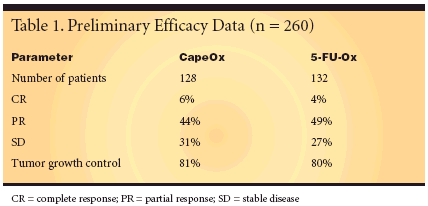CapeOx, 5-FU-Oxaliplatin Similar in Advanced CRC
MADRID, SPAIN-Preliminaryresults of a phase III trial comparingcapecitabine (Xeloda) and oxaliplatin(Eloxatin)(CapeOx) with
MADRID, SPAIN-Preliminaryresults of a phase III trial comparingcapecitabine (Xeloda) and oxaliplatin(Eloxatin)(CapeOx) withoxaliplatin and fluorouracil (5-FUOx)show similar efficacy and tolerabilityfor both regimens in first-linetreatment of advanced or metastaticcolorectal cancer, Javier Sastre, MD,said. Dr. Sastre of the Hospital ClinicalSan Carlos, Madrid, Spain, reportedthe early results (abstract 3524).Dr. Sastre said that the phase IIItrial was designed because both regimenshad promising phase II efficacy.He noted that oxaliplatin plus continuous infusion 5-FU is one of the standardchemotherapy regimens for firstlinetreatment in patients with advancedcolorectal cancer and thatphaseII trials have shown CapeOx is aconvenient combination, with a highactivity and a favorable safety profile.The study was intended to include 348patients with advanced or metastaticcolorectal cancer. Previous adjuvantchemotherapy was allowed.Patients were randomized to oneof two arms: Arm A consisted of oralcapecitabine (1,000 mg/m2 twice dailyfrom day 1 to day 15) plus oxaliplatin(130 mg/m2, 2-hour IV infusion onday 1), with cycles repeating every 3weeks; Arm B contained oxaliplatin(85 mg/m2, 1-hour IV infusion biweekly)plus 5-FU (2,250 mg/m2 as aweekly continuous infusion).

Both Regimens Well ToleratedDr. Sastre reported an interim analysisof patient characteristics including324 of 348 enrolled patients, witha median age of 65.9 years. Primarytumor sites were the colon (65%),rectum (28%), and both (6.1%). Sixty-eight percent of patients had onlyone disease site, mainly the liver(76.1%), lungs (31.5%), and lymphnodes (12.0%). Eighty-two percent ofpatients had undergone prior surgery,22% had undergone prior adjuvantchemotherapy, and 12% had undergoneprior radiotherapy. The medianrelative dose intensity was 90% forcapecitabine and 93% for oxaliplatinin arm A and 80% for oxaliplatin and78% for 5-FU in arm B.Dr. Sastre reported similar and verypromising efficacy for both regimensin 260 patients, with overall responserates of 50% with CapeOx and 53%with 5-FU-Ox (Table 1). CapeOx wasassociated with significantly moregrade 1 or 2 mucositis, bilirubinemia,hand-foot syndrome, and anemia,whereas 5-FU-Ox caused significantlymore grade 3 or 4 diarrhea."Safety results suggest a favorabletoxicity profile for both regimens. Preliminaryefficacy results suggest equivalenthigh efficacy for both regimens.Both regimens are feasible and welltolerated as first-line treatment formetastatic colorectal cancer," Dr. Sastreconcluded.